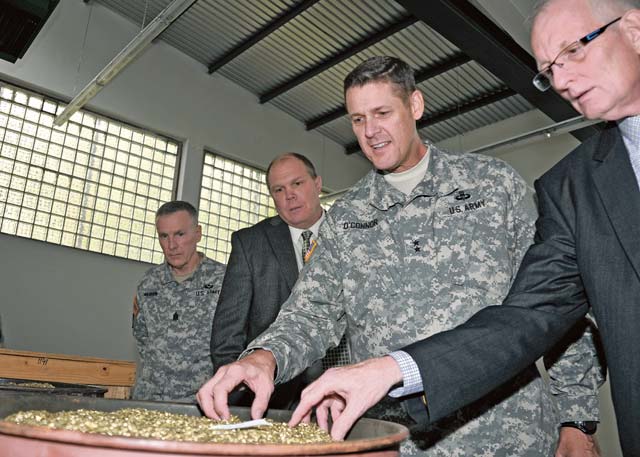
Amid intense budgetary concerns and with units across the Department of Defense striving to save money, one organization has found a way to bring money back into the Army by selling something most Soldiers see as garbage after a day at the range.
The Ammunition Center Europe, a subordinate organization to the Theater Logistics Support Center-Europe, has recently acquired a brass granulator machine with the ability to break used and empty brass ammunition cartridges into tiny flakes, which can then be sold for a profit.
“We now have the ability to granulate the brass here and then we can sell it to local contractors,” said Juan C. Gomez, chief of ACE’s material management division. “Sixty percent of the proceeds that we make out of the sale will go to the Army and 40 percent of the proceeds we can request for improvement of our facilities and installation.”
Current estimates show that the machine has the ability to shred enough brass to earn between $370,000 and $400,000 each quarter for the foreseeable future.
“It’s important because we’re saving the government money by granulating our own brass,” said Darren Williams, a munitions handler with ACE. “It’s more like a recycling program within the organization.”
Prior to receiving the granulator machine, ACE stored used brass at the Miesau Army Depot. During that 10-year period, the organization has accumulated more than 1,800 short tons of spent brass, ranging from .50 caliber rounds all the way down to 5.56 mm rounds.
Back then, “the normal process was to collect the brass and turn it into the Defense Logistics Agency, however, we were encountering too many problems,” Gomez said. “When we turned the items into the DLA, they would screen it, and as soon as they found a live round they would return everything back to us.”
The process of constantly shipping large quantities of brass back and forth between locations because of one or two live rounds in the bin became too tedious and expensive to maintain, so ACE decided to use some of the empty munitions bunkers at the depot to store the rounds.
“That was creating a big problem for us because we had to transport it over there, then we had to go back and transport it here, rescreen it and transport it back to them,” Gomez said. “The machine was not available to us 10 years ago, and now that it is available, we can deal with our own brass.”
Currently, the operation is in a pilot stage, testing the capabilities of the machine and making sure everything works correctly. The project is slated to become fully operational Monday.
“When we become fully operational we expect to be able to granulate up to 1,000 rounds per hour and we will be working on a daily basis,” Williams said. “The process is going very well because during the pilot stage we have moved past a lot of barriers.
“It feels good to be out here doing this job,” Williams added. “We’re in the process of bringing money back into our organization and to our community — we’re making money instead of spending money.”


